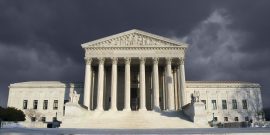Relying on the Court to enforce uniform opinions on rights when there is no consensus seems more like an invitation to civil war than to civil rights.
Patrick Charles and Kevin Francis O'Neil: Saving the Press Clause from Ruin
Patrick J. Charles and Kevin Francis O’Neil have posted Saving the Press Clause from Ruin: The Customary Origins of a ‘Free Press’ as Interface to the Present and Future (Utah Law Review, Vol. 2012, No. 3, 2012) on SSRN. Here is the abstract:
Based on a close reading of original sources dating back to America’s early colonial period, this article offers a fresh look at the origins of the Press Clause. Then, applying those historical findings, the article critiques recent scholarship in the field and reassesses the Press Clause jurisprudence of the Supreme Court. Finally, the article describes the likely impact of its historical findings if ever employed by the Court in interpreting the Press Clause.
And from the article:
This brings us to our second point — that if the Press Clause were reinterpreted in accordance with the historical findings outlined in this article, then Branzburg, Zurcher, and Pell would be overruled.Branzburg and Zurcher are wrongly decided under the historical interpretation of the Press Clause because, as a government watchdog with a structural role to play in the separation of powers, the institutional press must be protected from government “ransack[ing]” of newsrooms (through search warrants) and government-compelled disclosure of confidential sources and information (through grand jury subpoenas).Pell is wrongly decided for limiting press access to the same low level as public access vis-à-vis government-controlled information and events.
While I have only reviewed the piece quickly, it appears to have two main themes. First, it addresses and rejects the view of the Press Clause that Eugene Volokh takes in this important article, where Volokh argues that “the ‘freedom…of the press’ has long been understood as meaning freedom for all who used the printing press as technology – and, by extension, mass communication technology more broadly – and has generally not been limited to those who belonged to the institutional press as an industry.” Volokh has a good bit of original public meaning evidence for this conclusion. Charles and O’Neil dispute this.
A second theme of the piece is that original public meaning analysis, which is largely followed by Volokh, is ahistorical and a mistaken way to recover the original meaning. Here Charles and O’Neil adopt the historians’ frequently articulated criticism of this approach. I have to say that I rarely find the historians’ criticisms convincing. I certainly agree with historians that more information is better than less, and that historical context is important. And I certainly believe that the historical methods used to interpret the Constitution are relevant and even binding. See here. So, in a way, I accept some of the critique of original public meaning by historians, but much of this critique is accepted by the strictest advocates of original public meaning. So accepting these points is not a big deal. A more important point, however, is my sense that historians often use context and claims of historical method largely as ways of ignoring the legal meaning of provisions. These type of arguments largely leave me cold.
Charles and O’Neil argue:
Under the guise of originalism, many self-proclaimed legal histories assert a different approach. They focus intently on the text of the 1787-1791 constitutional debates and the years immediately following. While this may seem like a fair way to deduce original or public meaning of a constitutional provision, it fails to consider the intellectual origins of the text at issue and its evolution. For instance, are we really to believe that everyone viewed the Press Clause as solely the extension of free speech and being primarily influenced by the works of William Blackstone and a few others? The answer is no, because to understand eighteenth century American constitutionalism is to trace the evolution of political and legal thought from its Anglo origins through its development in the American Revolution, the Articles of Confederation, the ratification of the Constitution, and its subsequent application in legal thought. Any other methodical formulation is a dangerous and ad hoc approach to history.
I certainly agree it is important to know the history of freedom of the press before offering an original public meaning analysis. But that does not mean that the meaning in 1720 was the meaning in 1789. Or that the meaning in 1789 was a compromise between the meaning in 1720 and 1789, or that there was no clear meaning in 1789. Historians must recognize that the relevant question is what the language meant in 1789, and, if its 1720 meaning is not reflected in the later sources, that may be because the meaning changed. Thus, it makes sense that originalist articles, which are already long, should focus on the later evidence.
I must admit that perhaps I am not understanding the historians. Or perhaps they do not understand legal methods and legal meaning. Or perhaps the truth is somewhere in between.

